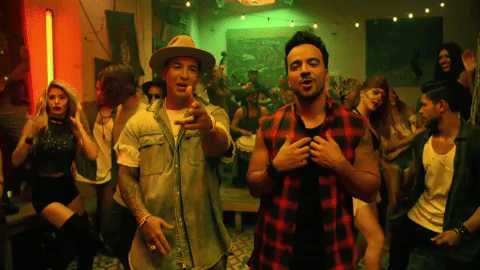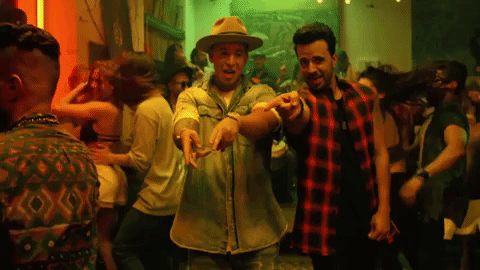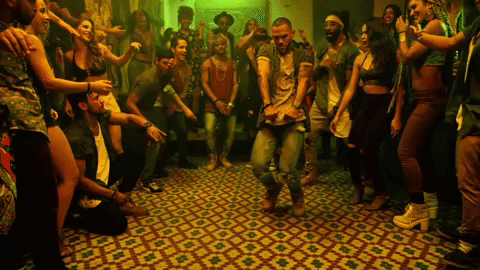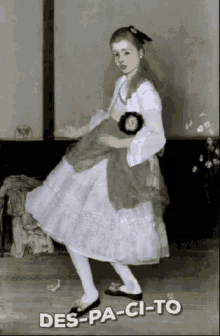Luis Fonsi + Daddy Yankee
Despacito
Despacito

👇 📺 👇

Luis Fonsi fT Daddy Yankee Zuleyka Rivera
 By Carolina Moreno
By Carolina Moreno


Luis Fonsi fT Daddy Yankee Zuleyka Rivera
En VIVO GRAMMYs 2018
👇 📺 👇
👇 📺 👇
‘Despacito’ Was Robbed At The Grammys
And We’re All Worse Off For It
By nearly every measure, it was the biggest song of 2017.

“Despacito” was on the verge of making history at Sunday night’s Grammy Awards.
The single’s remix, performed by Luis Fonsi and Daddy Yankee and featuring Justin Bieber, nearly became the first mostly Spanish-language song in Grammy history to win either record of the year or song of the year. The song had also been nominated in the Best Pop Duo/Group Performance category.
But by the end of music’s biggest night, “Despacito” had no more Grammys
than it did at the start. The Recording Academy’s shutout of the single revealed just how hollow the often-uttered platitude “music is a
universal language” actually is. Here’s why.


By nearly every measure, “Despacito” was the world’s biggest song of 2017. It not only broke nearly every record under the sun, but it finally made clear to the U.S. mainstream market the true power of Latin music on a global stage.


Luis Fonsi performs "Despacito"
Tonight Show
👇 📺 👇
The single began its climb up the charts worldwide when Fonsi and Yankee released the original version in January 2017. It was already a global phenomenon by the time Bieber remixed the hit in April, catapulting it up the U.S. charts.
By May, “Despacito” had become the first mostly Spanish-language No. 1 single in the country since the “Macarena” in 1996. By July, it had been crowned the most streamed song of all time. And by August, the music video had become the most viewed video in YouTube history. (As of Monday, the video still held that record with more than 4.7 billion views.)
By the end of the year, “Despacito” had
earned a total of 1.322 billion on-demand streams, according to Nielsen Music. Ed Sheeran’s “Shape of You,” which won the Grammy for best pop solo performance on Sunday, came in a distant second place with 999.69 million streams.
And “Despacito” has only continued to dominate in 2018. As of Saturday, the track and remix is one of only 18 songs to be certified diamond by the Recording Industry of America ― and it’s the first Latin song ever to do so.

Luis Fonsi - Despacito
(Pop Versión)
👇📺👇
Even at the 60th Annual Grammy Awards, the single stood out as the only song
to be nominated for both record and song of the year, a first for a foreign-language hit since Los Lobos’ “La Bamba” received both nods 30 years ago. And still, it got snubbed in both categories.

“Despacito” was everywhere in 2017, and that wasn’t just a fad or a fluke. It was an overdue acknowledgement of the growing power that Latin music ― particularly Spanish-language urban music ― has around the world.
All other things being equal, Spanish-language music dominated worldwide in
2017 in a way that mainstream American music failed to. Six of YouTube’s top 10 music videos of the year were Spanish-language hits, and seven were by Latino artists.
On streaming platforms, the popularity of Latin music is undeniable. In
December 2016, Spotify told Billboard that it only took two years for the “Baila Reggaetón” playlist to become the platform’s second most popular playlist globally.
“Last year at this time, we had 1.1 million subscribers. Today, we have 3.3 million,” Rocío Guerrero, Spotify’s global head of Latin content programming, told Billboard then. “It was a wake-up call for everyone. Now, Latin is a big priority for the company.”
There’s no debate that “Despacito” is worthy of a Grammy ― in fact, it netted four Latin Grammys in November, including song of the year and record of the year. If it had
taken either of those major honors at Sunday night’s ceremony, it would have been the first foreign-language song to win in either category since “Nel Blu Dipinto Di Blu (Volare)” by Domenico Modugno won at the very first Grammy Awards in 1958.
This history of exclusion of foreign-language music from major categories
suggests the Recording Academy doesn’t really view music as such a transcendent force. Because if music is really a universal language and it really knows no borders, then why do the Latin Grammys exist? The idea that the world, or even the country, can come together through music right now is crucial, if you ask Fonsi.
“The one thing about music is we can express ourselves through a song and kind of come together,” the Puerto Rican singer told HuffPost on the Grammys red carpet Sunday. “What ‘Despacito’ has done [is] to be able to break the language barrier, in a time when people, you know, they want to build walls and sort of separate and kind of forbid you from speaking your own language or celebrating your culture.”
It’s more important than ever to end the marginalization and segregation of
Latin music in the industry ― and the Grammys’ inability to recognize that is devastating.


Read what people on Twitter had to say about the “Despacito” snub.
- Goldroom - In five years when Latin music is allllll over pop music in the states the fact that Despacito didn’t win the big categories in 2018 is gonna look foolish. How was that not the most important record of this year? Most streamed + historic significance + critical praise?
- martu - I feel nothing but love for Bruno but are we all going to act like Despacito didn’t broke all those records, wasn’t streamed 24/7 in every damn radio and store until we couldn’t stand listening to it
- Michael S - Despacito was the TRUE Record of the Year. 5 billion views on YouTube, most streamed song in history. Record of the DECADE. But they didn’t win tonight. Why? I bet they don’t have a single Spanish-speaking voter in the pool of Grammy judges.




No comments:
Post a Comment